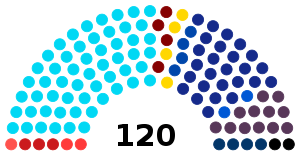1969 Israeli legislative election
Elections for the seventh Knesset were held in Israel on 28 October 1969. Voter turnout was 81.7%.[1]
| |||||||||||||||||||||||||||||||||||||||||||||||||||||||||||||||||||||||
| Turnout | 81.7% | ||||||||||||||||||||||||||||||||||||||||||||||||||||||||||||||||||||||
|---|---|---|---|---|---|---|---|---|---|---|---|---|---|---|---|---|---|---|---|---|---|---|---|---|---|---|---|---|---|---|---|---|---|---|---|---|---|---|---|---|---|---|---|---|---|---|---|---|---|---|---|---|---|---|---|---|---|---|---|---|---|---|---|---|---|---|---|---|---|---|---|
This lists parties that won seats. See the complete results below. | |||||||||||||||||||||||||||||||||||||||||||||||||||||||||||||||||||||||
| |||||||||||||||||||||||||||||||||||||||||||||||||||||||||||||||||||||||
The Alignment coalition was returned to power with the largest number of seats ever won in an Israeli election (56 out of 120). This was attributed to the government's popularity following the country's victory in the Six-Day War, and that the Alignment had been formed by an alliance of the four most popular left-wing parties, who between them had received 51.2% of the vote in the previous elections in 1965. As a result, Golda Meir remained Prime Minister.
Parliament factions
The table below lists the parliamentary factions represented in the 6th Knesset.
| Name | Ideology | Symbol | Leader | 1965 result | Seats at 1968 dissolution | ||
|---|---|---|---|---|---|---|---|
| Votes (%) | Seats | ||||||
| Labor | Social democracy Labor Zionism |
את | Golda Meir | 36.7% | 45 / 120 |
54 / 120 | |
| Gahal | National conservatism National liberalism |
חל | Menachem Begin | 21.3% | 26 / 120 |
26 / 120 | |
| Mafdal | Religious Zionism | ב | Haim-Moshe Shapira | 8.9% | 11 / 120 |
11 / 120 | |
| Rafi | Social democracy | כא | Moshe Dayan | 7.9% | 10 / 120 |
0 / 120 | |
| Mapam | Labor Zionism Socialism |
מ | Meir Ya'ari | 6.6% | 8 / 120 |
8 / 120 | |
| Independent Liberals | Liberalism | לע | Moshe Kol | 3.8% | 5 / 120 |
5 / 120 | |
| Agudat Yisrael | Religious conservatism | ג | Yitzhak-Meir Levin | 3.3% | 4 / 120 |
4 / 120 | |
| Rakah | Communism Socialism |
ו | Meir Vilner | 2.3% | 3 / 120 |
3 / 120 | |
| Poalei Agudat Yisrael | Religious conservatism | ד | Kalman Kahana | 1.9% | 2 / 120 |
2 / 120 | |
| Progress and Development | Arab satellite list | רא | Seif el-Din el-Zoubi | 1.8% | 2 / 120 |
2 / 120 | |
| Arab List for Bedouin and Villagers | Arab satellite list | יא | Diyab Obeid | 1.3% | 2 / 120 |
2 / 120 | |
| Meri | Socialism | ש | Uri Avnery | 1.2% | 1 / 120 |
1 / 120 | |
| Maki | Communism | ק | Shmuel Mikunis | 1.1% | 1 / 120 |
1 / 120 | |
| National List | Social liberalism | עמ | David Ben-Gurion | - | 0 / 120 |
1 / 120 | |
Results
 | |||||
| Party | Votes | % | Seats | +/− | |
|---|---|---|---|---|---|
| Alignment | 632,035 | 46.2 | 56 | −7 | |
| Gahal | 296,294 | 21.7 | 26 | 0 | |
| National Religious Party | 133,238 | 9.7 | 12 | +1 | |
| Agudat Yisrael | 44,002 | 3.2 | 4 | 0 | |
| Independent Liberals | 43,933 | 3.2 | 4 | −1 | |
| National List | 42,654 | 3.1 | 4 | New | |
| Rakah | 38,827 | 2.8 | 3 | 0 | |
| Progress and Development | 28,046 | 2.1 | 2 | 0 | |
| Poalei Agudat Yisrael | 24,968 | 1.9 | 2 | 0 | |
| Cooperation and Brotherhood | 19.943 | 1.4 | 2 | 0 | |
| HaOlam HaZeh – Koah Hadash | 16,853 | 1.2 | 2 | +1 | |
| Free Centre | 16,393 | 1.2 | 2 | New | |
| Maki | 15,712 | 1.1 | 1 | 0 | |
| List for the Land of Israel | 7,591 | 0.6 | 0 | New | |
| Peace List | 5,138 | 0.4 | 0 | 0 | |
| Young Israel | 2,116 | 0.1 | 0 | 0 | |
| Invalid/blank votes | 60,238 | – | – | – | |
| Total | 1,427,981 | 100 | 120 | 0 | |
| Registered voters/turnout | 1,748,710 | 81.6 | – | – | |
| Source: Israel Democracy Institute | |||||
Aftermath
Golda Meir of the Alignment formed the fifteenth government, a national unity government including Gahal, the National Religious Party, the Independent Liberals, Progress and Development and Cooperation and Brotherhood. There were 24 ministers. Gahal resigned from the coalition on 6 August 1970 after the government had decided to adopt the Rogers Plan.
The seventh Knesset was one of the most stable, with only three MKs changing parties; Meir Avizohar left the National List in 1972 to sit as an independent, before joining the Alignment the following year; Avner Shaki left the National Religious Party in 1972 and sat as an independent; and Shalom Cohen left HaOlam HaZeh – Koah Hadash in 1972.[2]
References
- Dieter Nohlen, Florian Grotz & Christof Hartmann (2001) Elections in Asia: A data handbook, Volume I, p125 ISBN 0-19-924958-X
- Mergers and Splits Among Parliamentary Groups Knesset
External links
- Historical overview of the Seventh Knesset Knesset (in English)
- Election results Knesset
- The Seventh Knesset Knesset